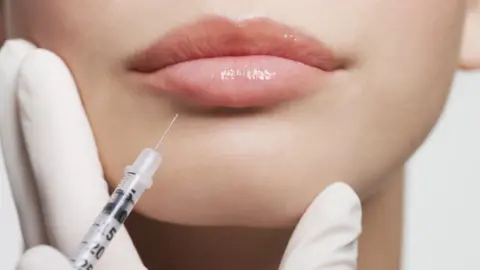Non-surgical beauty treatment industry like Wild West - MPs
 BBC
BBCThe "complete absence" of regulation of non-surgical beauty treatments, such as botox-style injections and fillers, is dangerous and must urgently change, say MPs.
After a year-long review, they claim the government has left the industry to regulate itself, despite concerns regularly raised by many within the sector.
Recommendations include mandatory training for all practitioners.
Patient Safety Minister Nadine Dorries says she will review the report.
The All-Party Parliamentary Group (APPG) on Beauty, Aesthetics and Wellbeing, says that while demand for non-surgical procedures has "exploded" in recent years, the UK government has failed to keep up - with aesthetic training courses almost entirely unregulated.
If invasive beauty procedures are not carried out properly, it can put the patient at risk of serious complications.
Such concerns were demonstrated in a recent BBC Three documentary which revealed complicated aesthetic procedures are being taught over the internet or on unsafe one-day courses.
"It's like the Wild West," explains inquiry co-chairwoman and Labour MP Carolyn Harris.
"We have people who are selling training courses which are not worth the paper they are written on. We have practitioners who are destroying the industry's reputation by practising completely unqualified and we have victims who are scarred for life."
The review makes 17 recommendations that it wants the government to implement.
These include introducing mandatory training for all practitioners and setting up a national licensing system, to ensure premises meet certain hygiene requirements.
It's hoped this would stop treatments taking place in "unsuitable locations" like offices, hotel rooms and pop-up shops.
'Kylie Jenner lips'
Make-up artist Sarah Draa, 23, first got filler in her lips when she was 18.

"I would say, 'I want Kylie Jenner lips, I want to look like Kim K,'" she explains. "There's so much pressure when you are seeing influencers on massive social media platforms every day."
After a few filler top-ups, Sarah still hadn't achieved the "juicy, pouty lips" she wanted - and lumps had started appearing.
She was also running out of money so decided to try the cheapest practitioner she could find.
One lump on her top lip got bigger and bigger.
"It become so noticeably big, my lips looked like they had collapsed," she says. "I had to have more filler put into the other side to balance it out.
"I looked disfigured and it was so sore."
Sarah eventually agreed to have the filler dissolved and later refilled, after meeting with practitioner Amish Patels who is a member of Save Face, a register for medical professionals who provide non-surgical cosmetic treatments.
"I have been working in the industry for over five years and never before have I had so many enquiries for people seeking help," Amish says. "I have built up my clinic and reputation on corrective work, which is sad. It shouldn't be that way."
Sarah agrees: "You need to think before you get these things done. Looking back, I realise how young 18 is and if I could go back I probably would hold off.
"I'm not an anti-filler person because I believe you should do whatever makes you happy, but if you're going to do it, do your research on a practitioner's experience and possible complications."
 Getty Images
Getty ImagesAs part of the Botulinum Toxin and Cosmetic Fillers (Children) Act 2021, it is due to become illegal for under-18s to receive Botox (botulinum toxin injections) or fillers in October.
However, MPs say this should be extended to other invasive treatments like thread lifts.
Aesthetic surgeon Dr Vincent Wong supports the idea, saying: "Eighteen years old is considered very young to be changing the structure or shape of your face. Young people should focus on good skin care products, but unfortunately many come to us and want to look like certain celebrities."
The report says social media platforms have driven demand for treatments and become a platform to sell them and must take responsibility for curbing misleading advertisements.
The inquiry also wants to challenge the idea that non-surgical treatments are a "quick fix" to improve self-esteem or happiness.
It has called for mandatory psychological screenings to take place ahead of treatments to understand a person's motivation and spot individuals at risk.
The Department for Health and Social Care will review the report's recommendations.
Nadine Dorries said: "Patients must always come first, and I am committed to protecting their safety making sure people have the right information they need to make informed decisions about cosmetic surgery and ensuring the highest quality training is accessible to all practitioners."
However, some fear that after years of inaction, little will change.
Dr Wong said: "If theses findings aren't enough for the government to finally make a move, I really don't know what it will take for them to take this seriously."
The devolved government in Scotland has carried out a public consultation on the regulation of non-surgical cosmetic procedures and says it expects to announce its next steps "in the near future".
Northern Ireland's Department of Health said in a statement it would consider the report and respond in due course, while the Welsh government said it will be doing further work in this "important area".
